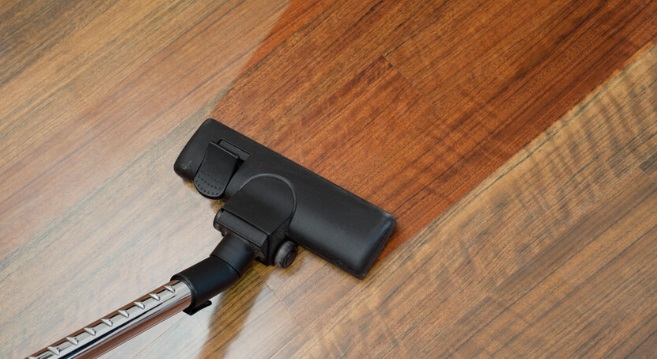Cleaning Hardwood Floors the Right Way – Smart Methods for Unblemished Beauty – Part Two

Hardwood flooring is expensive. But having hardwood flooring at your home can be beneficial. You just need to know how to take good care of your floor. Then you can keep it look clean and stunning at all times. Let’s take a look at some of the smart ways available to clean your hardwood flooring.
Use a vinegar solution (Make sure to test before use)
There is much discussion about whether or not to use a vinegar and water solution on hardwood floors, especially if you use it often. For flooring with a robust water-based coating, like polyurethane or urethane, vinegar treatments work best. Always test your solution on a discrete area before cleaning the whole floor, regardless of the situation. Here’s what to do when you’re ready to clean the whole space:
- Mix one gallon of water with one cup of distilled white vinegar.
- Dip a piece of cloth or your mop inside the solution and ring it heavily.
- You need to pass over your floor for one time and let it air dry fully.
Oil Stains and Dish Soap
Let’s imagine you spill some food on the floor, leaving a black grease stain that your standard cleaner can’t remove. Apply a few drops of regular dish soap to the area, and then use warm water and a clean towel to remove it. In the same manner that soap removes food from plates, it will also break up fat. Just be careful to prevent standing water and let the area completely dry.
Dark stains may also indicate that your flooring’ finish has been damaged. If dish soap is ineffective, break up the stain by buffing the area with the finest steel wool, often known as grade #000 steel wool with a little mineral spirits or floor wax.
White Rings or Mineral Oil
Your hardwood floors’ white stains are often a positive indication that the offending substance hasn’t gotten beyond the finish. Like when you lay a water glass on a hardwood table without a coaster, the white mark will often gradually diminish as it dries. If the white stain persists, however, the wood has to be treated. Here’s how to respond:
- Use a cloth to dust the area to get rid of any visible dirt.
- Mineral oil should be applied to a fresh cloth and softly scrubbed on the stain’s surrounding area.
- Mineral oil should then be left on the floor overnight and removed the following morning with a wet towel.
Buff for Thorough Cleaning
You may need to polish the hardwood if it has been a while since your floors had some significant TLC. When a room has several surface stains, scratches, and dents but no deep scratches or water damage that necessitates replacement or refinishing, buffing is the best option.
For around $50 per day, you can hire a buffer from your neighborhood hardware shop. The floor should be dry and prepared for the buffer after any grit has been removed by sweeping or vacuuming. Instructions on how to set up your floor for the procedure may also be included with the equipment.
Without a cleaning or with a particular hardwood floor buffing solution, buffers may run dry. For a smoother shine, the technique needs to remove the surface’s fundamental flaws.
How to Avoid Damage to Hardwood Floors
The best treatment, like with most things in life, is prevention. With a few maintenance techniques, you can prevent your hardwood floors from becoming dull, being scraped, or becoming stained. Never allow standing water to collect on your hardwood floors, for instance.
- Think about having your flooring refinished every ten years.
- If your dogs have sharp nails, you may want to consider putting down area rugs.
- Pay close attention to rooms with a lot of traffic.
- Removing stains promptly.
- Don’t let anyone enter the room with shoes that could leave a scratch or grit behind.
- Don’t use harsh chemicals or clean your floors excessively.
- To prevent scratches, remove grit at least once every week.
- Cover the legs of every piece of furniture with protective padding.
- If your floors are exposed to direct sunlight, choose a sunproof coating.
DIY versus Professional Hire
A professional house cleaner’s basic task is to clean hardwood floors. Despite the fact that most cleaning specialists charge between $30 and $50 per hour, they may also provide supplemental services like floor waxing and polishing for an additional flat rate of $25 to $50. When it comes to refinishing hardwood floors, prices may go from $400 to $6,000, but bear in mind that this only occurs around once every ten years.
If you want to clean your own hardwood floors, you’ll probably spend $10 to $50 on the necessary equipment and cleaning solution in addition to the $50 daily buffer rental price. Although cleaning hardwood floors yourself is simple and inexpensive, hired cleaners will guarantee that your floors remain spotless all year.
